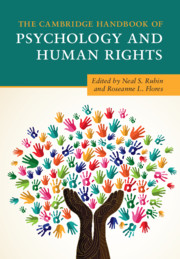Book contents
- The Cambridge Handbook of Psychology and Human Rights
- The Cambridge Handbook of Psychology and Human Rights
- Copyright page
- Dedication
- Contents
- Figures
- Tables
- Boxes
- Contributors
- Acknowledgments
- The Core International Human Rights Instruments and Their Monitoring Bodies
- Universal Human Rights Instruments
- Sustainable Development Goals
- Glossary of United Nations and Psychology Acronyms in the Handbook
- Introduction
- Part I History of Human Rights
- Part II The Intersection of Psychology and Human Rights
- Part III Contemporary Issues in Psychology and Human Rights
- Part IV Teaching, Research, and Training in Psychology and Human Rights
- 31 Decolonization and Liberation Psychology
- 32 Education of Psychologists for Human Rights Awareness, Accountability, and Action
- 33 Conducting Psychological Research across Borders
- 34 Diversity in Psychology Education and Training
- 35 Preparing Future Generations
- Part V Future Directions
- Index
- References
32 - Education of Psychologists for Human Rights Awareness, Accountability, and Action
from Part IV - Teaching, Research, and Training in Psychology and Human Rights
Published online by Cambridge University Press: 02 October 2020
- The Cambridge Handbook of Psychology and Human Rights
- The Cambridge Handbook of Psychology and Human Rights
- Copyright page
- Dedication
- Contents
- Figures
- Tables
- Boxes
- Contributors
- Acknowledgments
- The Core International Human Rights Instruments and Their Monitoring Bodies
- Universal Human Rights Instruments
- Sustainable Development Goals
- Glossary of United Nations and Psychology Acronyms in the Handbook
- Introduction
- Part I History of Human Rights
- Part II The Intersection of Psychology and Human Rights
- Part III Contemporary Issues in Psychology and Human Rights
- Part IV Teaching, Research, and Training in Psychology and Human Rights
- 31 Decolonization and Liberation Psychology
- 32 Education of Psychologists for Human Rights Awareness, Accountability, and Action
- 33 Conducting Psychological Research across Borders
- 34 Diversity in Psychology Education and Training
- 35 Preparing Future Generations
- Part V Future Directions
- Index
- References
Summary
This chapter begins with a rationale for infusing human rights into psychology education and the training of psychology professionals. It then presents the field of human rights education (HRE), including its definition as well as international and regional policies and theories that have evolved over the past 25 years, pointing out their relevance for psychology. In the final section, the chapter proposes human rights–related themes and methodologies for human rights education for psychologists, and social issues that influence and can be informed by psychology.
- Type
- Chapter
- Information
- The Cambridge Handbook of Psychology and Human Rights , pp. 475 - 489Publisher: Cambridge University PressPrint publication year: 2020



